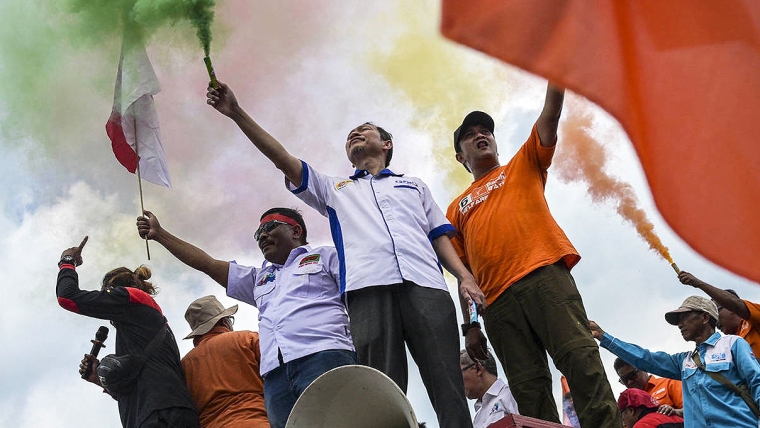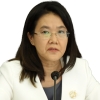
Less than 11 months into his term, Indonesian President Prabowo Subianto faces a stark choice. He can be remembered either as a leader whose presidency was defined by public anger and discontent, or as one who recognised the challenges facing his country and acted in the national interest.
The anti-government protests sweeping Indonesia over the past two weeks are not fleeting outbursts but the culmination of long-suppressed grievances against abuses of power, the erosion of constitutional norms, and the violation of basic human rights. The protesters are not seeking an apology or even sympathy from the president; they demand the chance to live a decent life in which their dignity and human rights are respected and upheld.
Prabowo’s administration has set its sights on making the country the world’s fourth-largest economy by 2045 – a goal that would require sustained annual growth of 8%. But with 68% of Indonesia’s population living below the poverty line for upper-middle-income countries, such ambitions mean little if millions of citizens remain trapped in poverty and hardship.
Indonesians have experienced rapid growth before, most notably during the long dictatorship of Suharto (1967-98), Prabowo’s former father-in-law. Given that history, they know that lasting and inclusive development gains depend on political and social reform, not strongman rule.
Blaming previous administrations or consolidating power among key parties – which may provide short-term stability but weakens democratic resilience – will not absolve the current government of responsibility for its decisions today. What Indonesia needs are concrete measures to reduce poverty, create employment opportunities, and restore trust in government.
To heal the country’s deepening social fractures, policymakers must focus on four urgent priorities. First, they must enforce the separation of powers and eliminate conflicts of interest. Democracy flourishes only when the executive, legislative, and judicial branches operate independently, yet in Indonesia, power remains heavily concentrated. Many political parties operate as family-run enterprises, with leaders holding executive roles or wielding outsize influence across institutions. This concentration fosters a culture of impunity and erodes public trust.
Clear ethics rules are essential. Public officials – including the president, cabinet members, and parliamentary leaders – should not hold party posts, positions in state-owned enterprises (SOEs), and private-sector jobs simultaneously. Eliminating these overlaps would reduce corruption, ensure that policies serve citizens rather than private or partisan interests, and bolster the credibility of Indonesia’s democratic institutions.
Second, fiscal transparency is critical to delivering better-targeted social assistance and accelerating SOE reform. For two decades, Indonesia’s tax-to-GDP ratio has stagnated at 10-12%. While the 2026 budget projects revenues totaling 12% of GDP, early 2025 figures are lagging this target – a shortfall worsened by a decline in commodity revenues.
At the same time, budget pressures continue to mount, underscoring the need for fiscal discipline. The government’s Free Nutritious Meals program is a prime example. Though well-intentioned, it is prohibitively expensive, with a budget of 171 trillion rupiahs (US$10.3 billion) that is expected to rise to 335 trillion rupiahs in 2026. A more effective approach would be to pilot the program in five underserved regions, at a cost of no more than five trillion rupiahs, while engaging with local communities. The remaining funds could be used to support teachers, health professionals, and waste-management workers, or finance programs that deliver tangible benefits to low- and middle-income households.
Similarly, the new Danantara sovereign-wealth fund, with its 300 trillion rupiah budget, is unnecessary. With public debt at 41% of GDP, new borrowing should be directed toward productive investment rather than bureaucratic expansion. Reforming existing SOEs would be cheaper, faster, and more effective. While consolidation has reduced the number of SOEs from 118 in 2018 to 64 in 2024, the state still dominates sectors ranging from banking to hospitality, crowding out small enterprises.
Third, civil authority must be strengthened to curb military interference. Military or police intervention in civilian affairs tends to undermine democratic institutions. In Indonesia, where the military continues to wield significant political influence, preserving clear boundaries is particularly important. That means codified institutional checks, stronger civilian oversight, and strict adherence to human-rights norms. Without these safeguards, Indonesia risks sliding toward the instability seen in Myanmar or in parts of Latin America and Africa.
Lastly, the long-delayed Asset Recovery Bill (RUU Perampasan Aset), which would empower the state to reclaim disproportionate wealth without waiting for a criminal conviction, must be enacted. Crucially, its aim is not to seize assets arbitrarily but to ensure that stolen public assets are restored to their rightful owners – the people. First drafted in 2008 and submitted to parliament in 2012, the bill has languished for nearly two decades, enabling corrupt actors to plunder public resources with impunity.
By establishing a civil process for recovering unexplained wealth (in rem asset recovery), the law fulfills Indonesia’s obligations under the United Nations Convention Against Corruption and shows that the government stands with citizens in fighting abuses of power. If Prabowo channels this recovered wealth into education, health care, and social programs, he could leave a truly transformative legacy.
Indonesia’s leadership can choose to deepen repression, or it can take a different path and strengthen democratic governance. Prabowo’s legacy will not be measured by electoral margins but by whether his government respects human rights, improves health care and education, and creates more good jobs. He can be remembered as the president who presided over Indonesia’s largest protests since Suharto, or he can be celebrated as a leader who delivered political, social, and economic justice. The choice is his.
Lili Yan Ing, Secretary General of the International Economic Association, is Lead Adviser for the Southeast Asia Region at the Economic Research Institute for ASEAN and East Asia. Copyright: Project Syndicate, 2025, and published here with permission.
1 Comments
I know Indonesia reasonably well, I'm here right now, and I've been coming here regularly for 20 years. IMO, the real problem is that corruption is deeply ingrained and widely spread. People want to be in position of power to line their own pockets not for the public good, this is unfortunately a widely expected and accepted path.

We welcome your comments below. If you are not already registered, please register to comment
Remember we welcome robust, respectful and insightful debate. We don't welcome abusive or defamatory comments and will de-register those repeatedly making such comments. Our current comment policy is here.